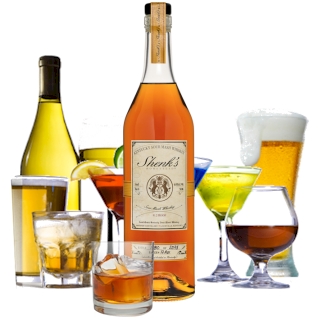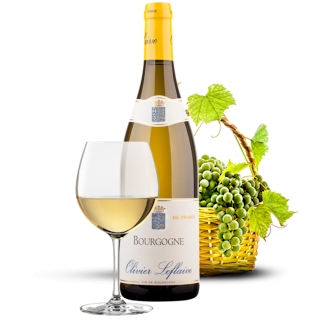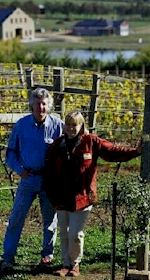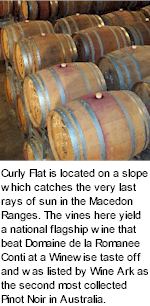


Fortunately for Moraghan, his partner Jeni shared the vision that has brought together the dedicated team to nuture Curly Flat from a romantic ideal to awesome reality. Pursuit of the dream and a cool climate suited to Pinot Noir, brought Phillip and Jeni to Lancefield in the Macedon Ranges near Melbourne. The high altitude region is ideally suited to wine growing, with well drained volcanic soils and moderate rainfall. Curly Flat is located on a slope that catches the very last rays of sunshine in the magical moments before dusk. This prolonged exposure to the Autumn sun provides a vital ingredient for the very special fruit that is produced at Curly Flat. To build expertise Jeni and Phillip volunteered their labour in other vineyards and wineries - but it was Macedon Ranges pioneer, Laurie Williams (Flynn & Williams label), who nurtured their understanding and passion for growing wine.

Phillip began studying viticulture and travelling overseas to gain experience in wine growing and making, he has done several vintages in the USA, including Ponzi Vineyards in Willamette Valley Oregon and Russell Hearn's Premium Wine Group on Long Island NY. The first vines were planted at Curly Flat in 1991 and progressively added to, principally Pinot Noir with some Chardonnay and a little Pinot Gris. A new winery was constructed and the original homestead, built in 1890s, has been extensively renovated to host wine tastings and other wine related events. Prior to the 2002 vintage the wines were made at a neighbouring winery under contract, with equipment and labour input from the Curly Flat Team. In 2002 Phillip took over the winemaking role, under the guidance of one of Australia's leading winemakers who is a renowned Pinot Noir specialist.
The central focus of the entire Curly Flat operation is the vineyard. Philosophy is based on the belief that good and great wine is primarily a product of the vineyard, the site, the soil and how the viticulturalist manages all components of the vineyard. Annual and long term management practices and all decisions on variety, clones, rootstocks, trellis systems combine to produce the finest of wine grapes.
The choice of trellis systems sets Curly Flat apart from most vineyards. Divided trellis systems, particularly the Lyre, are more costly to construct and manage, thus rarely used. Only manual harvest is possible thereby greatly reducing its attraction to larger more commercial wine concerns. The vine canopy has two curtains of foliage, allowing sunshine inside the trellis walls to maximise exposure to sunlight, facilitating better ripening, improved wine colour, increased intensity of flavour and reduced plant disease risks.

In choice of vines, Curly Flat follows the European approach of selected multiple clones to gain increased complexity. To date Curly Flat has five clones of Pinot Noir and four of Chardonnay. Curly Flat was selected by the Victorian & Murray Valley Vine Improvement Association to be one of only two Victorian mothervine custodians of the most recently introduced Burgundy Pinot Noir clones, 114 and 115.
As in viticulture, education, training and experience are core to having the necessary skills to manage the growing and making of fine wines. Curly Flat vineyard is tended by a dedicated team of full time vineyard staff. Several are studying, or have completed, apprenticeships in Viticulture. The foundation of winery culture is the belief that it is the grapes from the vineyard that are the primary determinant of final wine quality. In essence, good wine comes from good fruit - the better the fruit, the more the winemaker becomes a custodian of nature's handiwork. Thus the winery culture at Curly Flat is one of guidance of the natural ingredients from the vine to wine, with minimal intervention. Nothing integrates the constituent parts of wine as well as Mother Nature. None of the fruit is actually crushed, Pinot Noir is a combination of whole bunch and de-stemmed fruit, while the Chardonnay is all whole bunch pressed. Both practices follow the traditional minimalist approach to these two classic varieties.
Most Australian vineyards are on thin topsoil over undifferentiated clay soils, vines will not grow down into undifferentiated clay, they grow along it. That is not so at Curly Flat. Vines are fortuitously planted to grow their roots in a manner that greatly enhances the health of grapes, intensity of fruit and quality of harvest. Curly Flat abstain from herbicides and chemical additions, choosing instead to employ biodynamic preparations. The vineyard has responded in many ways and it shows in the quality of wine. Native grasses have taken over and the vine floor has come alive, as has the multiplicity of beneficial biodiversity. The team at Curly Flat now have a collective experience of decades within this site. That too is starting to show in the wine quality. Every effort is directed to growing fruit that will convert to very good, sometimes great wine.
